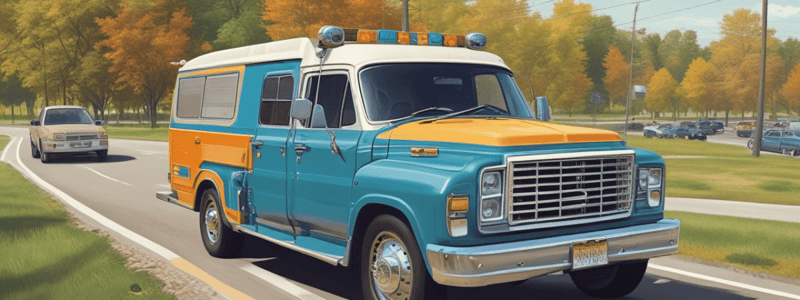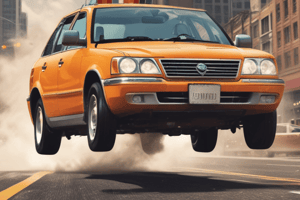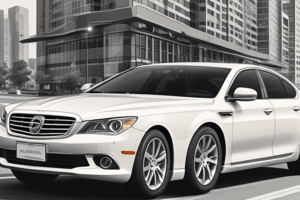Podcast
Questions and Answers
What is the ideal angle and distance for a vehicle to cross a turn?
What is the ideal angle and distance for a vehicle to cross a turn?
- 90 degrees at a 1-foot distance
- 45 degrees at a 1-foot distance
- 55 degrees at a 2-feet distance
- 45 degrees at a 2-feet distance (correct)
What is a key consideration when selecting a route during an emergency response?
What is a key consideration when selecting a route during an emergency response?
- Driving during peak commute hours
- Avoiding roads with high traffic volume (correct)
- Choosing roads with heavy pedestrian traffic
- Selecting roads with a higher speed limit
What is a benefit of using one-way streets during an emergency response?
What is a benefit of using one-way streets during an emergency response?
- More options for turning
- Fewer pedestrians and slower traffic
- Increased visibility at intersections
- Avoiding on-coming traffic (correct)
What is a critical aspect of route selection during an emergency response?
What is a critical aspect of route selection during an emergency response?
Why should headlights be used in conjunction with emergency overhead lights during daytime?
Why should headlights be used in conjunction with emergency overhead lights during daytime?
What is the main objective of threshold braking?
What is the main objective of threshold braking?
What is the primary advantage of 9 and 3 steering?
What is the primary advantage of 9 and 3 steering?
What can affect the audibility of a siren during an emergency response?
What can affect the audibility of a siren during an emergency response?
What is a key consideration when using emergency warning devices at night?
What is a key consideration when using emergency warning devices at night?
What is the best steering technique for gradual turns?
What is the best steering technique for gradual turns?
What is a benefit of practicing route selection during non-emergency driving?
What is a benefit of practicing route selection during non-emergency driving?
What is the geometric high point on the inside of a turn?
What is the geometric high point on the inside of a turn?
What is a key aspect of emergency warning devices during an emergency response?
What is a key aspect of emergency warning devices during an emergency response?
What is the correct Line of Travel through a true apex turn?
What is the correct Line of Travel through a true apex turn?
Why is it important to consider weather conditions when using emergency warning devices?
Why is it important to consider weather conditions when using emergency warning devices?
When making a left turn, what should you do while in the straight away?
When making a left turn, what should you do while in the straight away?
What is the purpose of ABS in a vehicle?
What is the purpose of ABS in a vehicle?
What is the primary consideration for route selection during emergency driving?
What is the primary consideration for route selection during emergency driving?
What is the primary factor that reduces the effectiveness of sirens in foggy weather?
What is the primary factor that reduces the effectiveness of sirens in foggy weather?
What is the primary reason why emergency lights are virtually ineffective in foggy weather?
What is the primary reason why emergency lights are virtually ineffective in foggy weather?
What tends to absorb sound in residential areas?
What tends to absorb sound in residential areas?
Why are sirens more effective in warning pedestrians?
Why are sirens more effective in warning pedestrians?
What is the primary reason why drivers and pedestrians may not see or hear an emergency warning device?
What is the primary reason why drivers and pedestrians may not see or hear an emergency warning device?
What is the recommended hand position on the steering wheel during pursuit driving?
What is the recommended hand position on the steering wheel during pursuit driving?
Why should you avoid crawling into the trunk of the vehicle you are chasing?
Why should you avoid crawling into the trunk of the vehicle you are chasing?
What is the primary reason why you should not depend on your siren to move other vehicles out of the way?
What is the primary reason why you should not depend on your siren to move other vehicles out of the way?
When should you abandon a pursuit?
When should you abandon a pursuit?
What is the primary reason why you should know the area during a pursuit?
What is the primary reason why you should know the area during a pursuit?
Flashcards are hidden until you start studying
Study Notes
Emergency Maneuver Techniques
- Threshold braking: applying maximum pressure short of lock-up, releasing gradually to avoid lock-up while maintaining maximum pressure throughout.
- 9 and 3 Steering: using light finger pressure, heavier pressure with thumb; excellent for quick steering needs, body balance, and quick access to dashboard control items.
- Shuffle Steering: avoiding crossing hands by sliding the wheel in small amounts; best for gradual turns.
Line of Travel for a True Apex Turn
- The true apex of a turn is the geometric high point on the inside of a turn.
- The correct Line of Travel through a true apex turn: outside-inside-outside.
- For a left turn: move out to the right side of the roadway, brake in a straight line, coast to the inside at the apex, then accelerate to the outside/right edge.
- For a right turn: move to the left side of the roadway, brake in a straight line, coast to the inside at the apex, then accelerate to the outside/left edge.
- The vehicle should cross within two feet of the apex at a 45-degree angle.
Route Selection and Warning Devices
- Factors affecting route selection: traffic density, pedestrian traffic, road conditions, and line-of-sight conditions.
- The goal of route selection is to reach the destination as quickly and safely as possible.
- Emergency warning devices: headlights, emergency flasher lights, and sirens.
- During daylight, use headlights in conjunction with emergency overhead lights.
- During hours of darkness, use high beam lamps.
- Sirens may be required by statute, regardless of the time of day.
- Emergency lights and sirens are not substitutes for caution and mastered driving skills.
Safety Techniques Relating to Pursuit Driving
- Hands should be at the 9 and 3 position on the steering wheel.
- Vary the pitch of the siren from time to time.
- Seatbelts should be tightened up slightly.
- Talk on the radio as little as possible and only on straight-aways and in uncongested areas.
- Flash lights when approaching another vehicle from the rear.
- Use high beams as much as possible.
- Don't crawl into the trunk of the vehicle you are chasing.
- Don't pursue into a dust trail or cloud.
- Know the area and don't depend on your siren to move other vehicles out of the way.
- KNOW YOUR LIMITATIONS AND YOUR VEHICLE'S LIMITATIONS AND DON'T EXCEED THEM.
- Keep wheels well away from pavement edges.
- If you must go through red lights and stop signs, slow enough to ensure that no motorist or pedestrian will be endangered.
When to Abandon a Pursuit
- Abandon a pursuit if you feel you're driving over your or your vehicle's limitations.
- Abandon a pursuit if the vehicle has a malfunction.
- Other good reasons to abandon a pursuit include:
- If the pursuit is no longer justified due to changing circumstances.
- If the officer's safety or the safety of others is at risk.
Studying That Suits You
Use AI to generate personalized quizzes and flashcards to suit your learning preferences.




